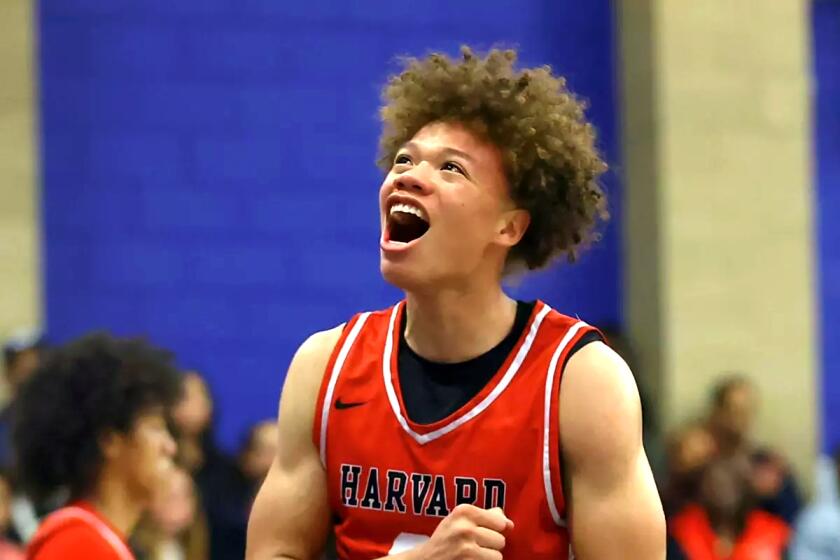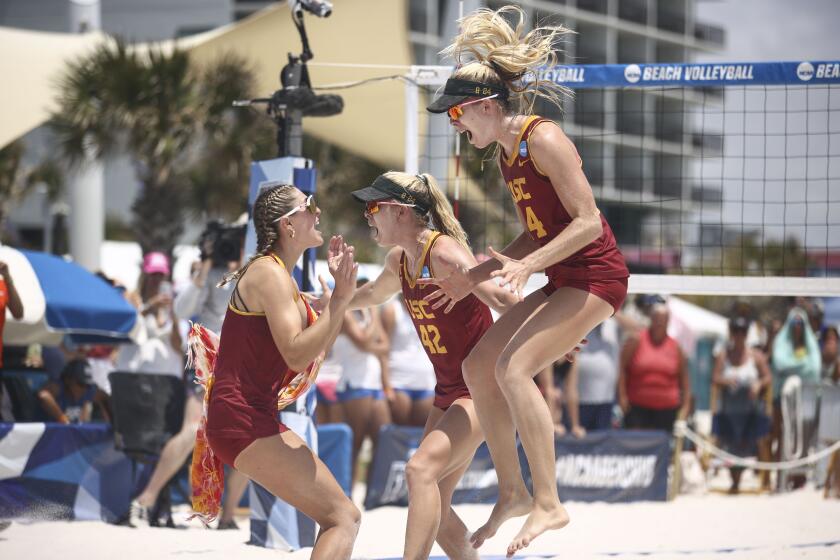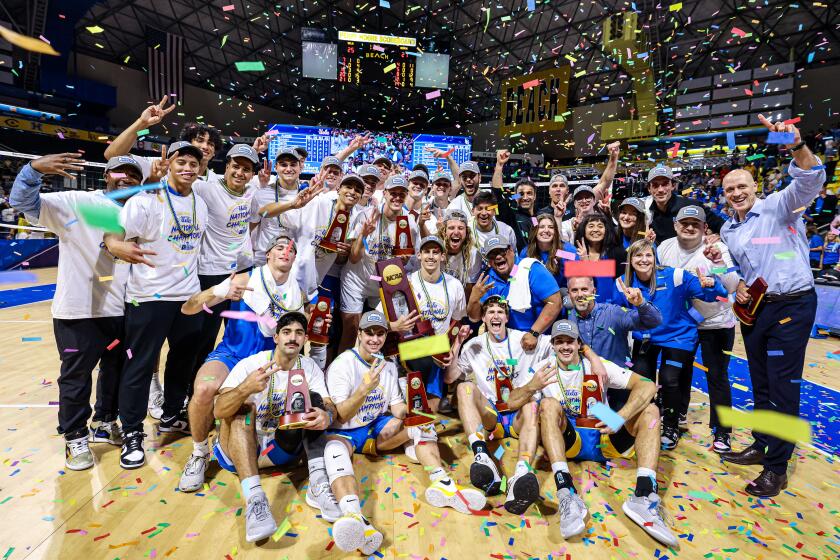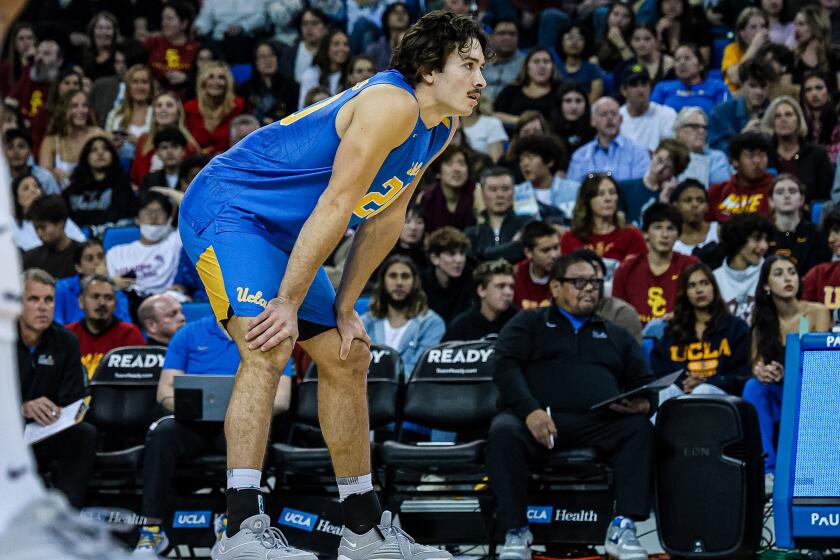Harrick Can’t Believe This Is Happening
They won’t have Jim Harrick to kick around any more. After bringing success and pride back to the UCLA basketball program, Harrick has been dishonorably discharged as head coach, impeached for a cover-up following what to him seemed no worse than a third-rate rules breach.
“I made a mistake, but to cost you your job?” Harrick appealed on a gloomy November afternoon, high above Beverly Hills inside a sixth-floor law office, where he spent part of Wednesday morning seeking legal recourse. “The punishment outweighs the crime, by a million times.
“To think someone can do this to your life.”
Hours before, however, UCLA’s chief administrator had made it perfectly clear that to him, lying and cheating were not venial sins exaggerated a millionfold. Charles E. Young, the university’s chancellor, actually cited Watergate as a similar example of wrongdoing compounded by a guilty party’s unwillingness to cop to it.
Young emphasized that “we might have responded less severely,” had Harrick been more forthcoming with an explanation of, principally, an Oct. 11 dinner that resulted in improper contact between collegiate and prep student-athletes, and, subsequently, an expense accounting of that dinner that fudged the details sufficiently to represent unpardonable malfeasance.
In other words, Harrick got caught in an untruth and couldn’t talk his way out of it.
These facts are not in dispute.
What remains open to debate is why UCLA opted for dismissal, rather than discipline. To the coach and his advocate, attorney Robert Tanenbaum, the firing of Harrick was an action of such severity as to constitute “Draconian remedy,” to use the attorney’s words. Yet to those who did the firing, Young, in consort with Athletic Director Peter T. Dalis, Harrick’s transgressions were those of a scholastic role model--”under an enormous public eye,” the chancellor said--who must be held to a higher standard.
“Terminated with cause,” is how Young phrased it.
Was this decision his alone?
“Yes.”
Does it not seem a little harsh?
“Yes.”
Speculation ran rampant that there must be something more to this, some previous displeasure on the administration’s part with Harrick’s coaching or recruiting methods, perhaps, or residue from the recent Blazergate controversy involving the coach’s son, but such was denied on all fronts. A whispered-about sexual harassment case? “Absolutely unfounded,” Harrick said, justifiably indignant at the nerve of people who believe they can express any thought, blurt any rumor, in public places. “Why would you ask me that?”
So, what, then?
The dinner at Monty’s restaurant, at which three recruits were entertained by UCLA coaches Harrick and Steve Lavin, plus returning players Jelani McCoy, Bob Myers and Kris Johnson, created the situation, particularly when teammates Cameron Dollar and Charles O’Bannon joined the party, two too many guests for the NCAA’s taste. Allegedly misrepresenting the additional guests, as someone other than Dollar and O’Bannon, exacerbated the situation, as did an incorrect accounting of who paid for what.
Seated in a high-backed, wine-colored leather chair that seemed to swallow him whole as he slumped in it, Harrick, 58, his NCAA championship ring still on his right hand, offered a mea culpa. He did not deny that the expense voucher was inaccurate, saying, “I don’t say I’m not at fault. I apologized. I sometimes use poor judgment.
“All I can say is, I have 37 years in this profession, and there’s never been one word about Jim Harrick and this sort of thing. I’ve made out reports for nearly 25 years at various universities, nine years at UCLA now, and never a problem. If I make a mistake, then I make a mistake. I’ve corrected errors here and there, because, man, I do 50 of these things a year.
“Would they go through the receipts of everybody at UCLA, of every administrator, looking for errors? I doubt it.”
Had he an inkling this one might cost him his job?
“Absolutely no idea,” Harrick said.
Did he offer to quit?
“I told them I’d walk away at the end of this season, if they asked me to. But not now.”
Fired, because he refused to quit, Harrick spent most of Wednesday morning at home, trying to sort everything out, then consulted with Tanenbaum, who has handled wrongful-dismissal suits of a high-profile nature in the past. When asked whether he would characterize what happened to him as a witch hunt, Harrick demurred, but Tanenbaum interjected, “I will. I’ll characterize it as a witch hunt. They [UCLA] have been after him for a long time. What is it that Jim Harrick has done, if indeed he has done anything, for the University of California at Los Angeles to deny him the very rudiments of due process?
“To stigmatize their basketball coach this way, you have to wonder: What is their agenda?” the attorney added.
Leaving the law office, Harrick invited a couple of longtime acquaintances onto the elevator as it descended to the Beverly Hills business district below. He said his UCLA players were invited to his house Wednesday night, to discuss what had happened and ask questions. As the elevator doors closed, Harrick said, “Come on in. I need some close friends around me, right about now.”
He leaned into one friend’s ear.
“You know, I’ve served this university well,” Harrick whispered.
In a book the coach co-wrote after his only national championship season, Harrick, who was hired April 12, 1988, and fired Tuesday, alluded to Dalis once telling him that the only way the UCLA athletic director could make everybody happy was to go 30-0, win the national championship and fire the coach. Of the UCLA job, Harrick wrote in 1995: “Great, awful, challenging, frustrating, exhilarating, debilitating, funny, grim, rewarding, annoying, fulfilling, absurd. And then comes Tuesday.”
Go beyond the scoreboard
Get the latest on L.A.'s teams in the daily Sports Report newsletter.
You may occasionally receive promotional content from the Los Angeles Times.



